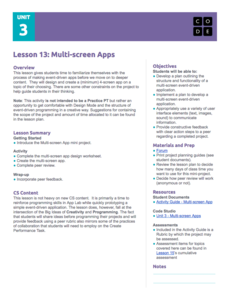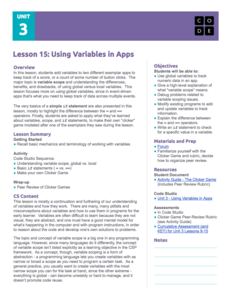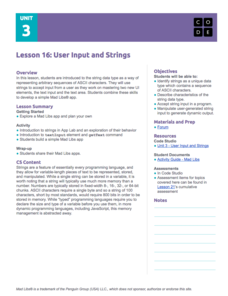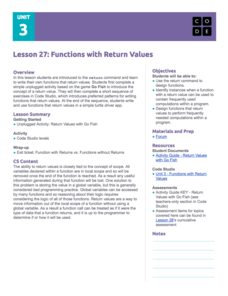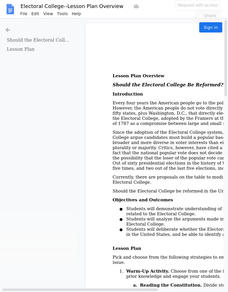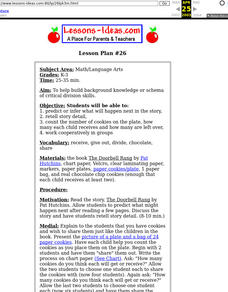Code.org
Multi-screen Apps
Scholars continue their study of event-driven programming by creating a multi-screen app in the fifth lesson of the series. They incorporate previously learned elements and events in the mini-project.
Code.org
Controlling Memory with Variables
Not all variables are created equal. Discover how variables in computer science are different from variables in math class. Scholars learn to work with variables in computer programming by developing a mental model for how variables...
Code.org
Using Variables in Apps
Investigate the benefits of using global variables. The seventh installment of a 21-part unit continues the study of variables from the previous lesson. Young computer scientists modify two existing apps by adding variables and learn how...
Code.org
User Input and Strings
Pupils learn to apply strings in computer science. They master two new user interface elements and also use string type data to represent ASCII characters. Finally, individuals create an app for Mad Libs in the eighth lesson plan of the...
Code.org
Introduction to Conditional Logic
On one condition ... explore how to use conditionals within conditionals. Scholars apply conditional statements to improve upon the app they built during a previous lesson. They also learn about nested conditionals in the 11th lesson of...
Code.org
Processing Arrays
Scholars use a playing card activity to help them develop a program to find the minimum value of a list. They learn to use for loops to write code that will process lists.
Code.org
Functions with Return Values
Young computer scientists explore how to use the return command in computer programing by playing Go Fish. They learn about functions that return values and then write a turtle driver app using the return function.
Code.org
Canvas and Arrays in Apps
Scholars learn how to make a digital canvas and fill it with artwork by creating a drawing app using the canvas element. The activity requires learners to previous knowledge of arrays and return commands to draw images.
Code.org
Practice PT – Improve Your App
The last installment of a 21-part unit is a practice performance task that asks class members to design an app using skills from the unit. Scholars take one of the previous apps from the unit and modify it by adding elements and making...
Code.org
Events Unplugged
Introduce event-driven programming. Young computer scientists learn the meaning of event-driven programming and how it is different from previous styles of programming. They play a card game to simulate the challenges that occur in this...
Code.org
Event-Driven Programming and Debugging
Start programming in event-driven style. Scholars learn to place buttons on the user interface and use event handlers. They also learn to recognize errors in code and debug as necessary. This is the second lesson plan in the series of 21.
Code.org
Image Scroller with Key Events
Discover how to embed images in lists. Scholars modify an existing app to include an image scroller in the 17th lesson of the series. They learn to refactor code and remove redundancies after modifying code.
Code.org
Introduction to Arrays
How can you store lists in a computer program? The 16th installment of a 21-part unit introduces arrays as a way to store lists within a variable. Individuals program a list of their favorite things—adding interest to the activity.
Code.org
Beyond Buttons Towards Apps
Explore how people use event-driven programming in games with a lesson that teaches scholars to use new screen elements and events. They apply these new elements to create a simple chaser game.
Code.org
Digital Assistant Project
Scholars apply previously learned skills to create a functional computer program. They produce a digital assistant incorporating string commands and complex conditional logic.
Code.org
While Loops
Bring your pupils in the loop with while loops. Scholars learn how to modify conditional statements to produce while loops in the 14th activity of the series. They use flowcharts to understand loops and then program some examples of loops.
Code.org
Looping and Simulation
Young computer scientists continue programming with while loops by creating a program to simulate coins flipping.
Code.org
One-way Functions – The WiFi Hotspot Problem
Pupils attempt to solve the Wireless Hotspot Problem and learn why it is considered a computationally hard problem in the ninth lesson of the series on 12. They also learn about one-way functions and how the Wireless Hotspot Problem is...
Curated OER
Gerund Board Game
Play a board game that tests learners' knowledge of gerunds and promotes discussion. As players move along each square, they answer questions using a gerund.
C-SPAN
What Are Ways for Youth to Engage in Politics?
Help young people become excited to participate in politics. High school historians participate in an engaging lesson focused on ways for youth to become involved in government. Scholars review articles, videos, and essential vocabulary...
C-SPAN
Electoral College
Most people are surprised to learn that American democracy is not as direct as they thought. Using a package of guiding questions, charts and curated videos, learners unpack the unique American institution of the Electoral College. The...
C-SPAN
Should Your State Modify Its Voter Registration Laws and Methods for Submitting a Ballot?
What is the balance between democracy and security? Using articles and videos that examine state voting procedures, learners explore the difficult question. After looking at voting regulations in their state and nationally, they consider...
Holly Middle School
Leadership 101
A four-week leadership class is designed to help scholars develop the skills they need to become effective leaders. Pupils study the habits of highly effective people and apply these concepts to leadership. They investigate paradigm...
Curated OER
Lesson Plan #26
Students build background knowledge or schema of critical division skills by predicting or inferring what will happen next in the story, retelling story detail, and counting the number of cookies on the plate.
Other popular searches
- Equal Sharing
- Sharing and Caring
- Sharing Equally
- Preschool Sharing and Caring
- Sharing Memories
- Sharing Opinions
- Sharing and Getting Along
- Division Sharing
- Information Sharing
- Sharing African Culture
- Sharing and Caring Stories
- Equal Sharing Division


